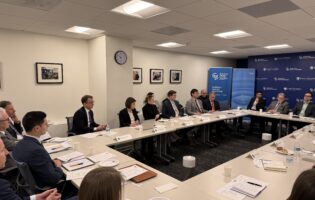Germany-in-Europe: The 2013 Federal Election & The Euro-Crisis
On May 30, 2013, the AGI Business & Economics Program and the Friedrich Ebert Foundation hosted a discussion with Vice-Chairman of the SPD Parliamentary Caucus Joachim Poss. Mr. Poss was interviewed by Alexander Privitera, Director of the AGI Business & Economics Program. The discussion focused on the SPD’s election platform issues (i.e., affordable housing, energy policy, bank supervision, labor market inequality, and tax policy) and how the euro zone crisis impacts German politics and the 2013 federal elections.
Mr. Poss defended the SPD’s support of working class taxpayers by emphasizing that banks need to pay for resolution costs and be subject to considerably more oversight by the European Central Bank (ECB). Concerning tax policy, the SPD does not support a tax treaty with Switzerland and advocates for tax increases on the top 4 to 5 percent of the tax base. Mr. Poss expressed concern over how the gradual phasing out of nuclear energy would affect electricity taxes on corporations and industries, given the highly industrialized, export-oriented nature of the German economy. Therefore, he supports a “master plan” between the federal and state governments that would be specific to states’ energy needs, consumption levels, and capacities. He also called for ending temporary employment and enacting a national minimum wage. In regard to the euro zone crisis, Mr. Poss emphasized that it is a sovereign debt crisis, therefore making it difficult for Chancellor Merkel’s coalition to solve the issue on its own. Consequently, Chancellor Merkel’s austerity policies have limited her coalition partner options in light of the FDP’s low approval ratings. However, Mr. Poss does not see the crisis as factoring that prominently in the elections due to Germany’s comparatively favorable economic standing.
The discussion highlighted how the main issues of the 2013 federal elections largely surround the maintenance of sound and transparent public finances. That is, if nuclear energy is to be phased out by 2022, how does it affect electricity costs? The wealthy need to contribute to welfare through increased taxes and should not evade taxes by putting their money in tax havens such as Switzerland. Furthermore, working class German taxpayers’ money should not go to fledgling banks and fiscally irresponsible southern tier euro zone members.







